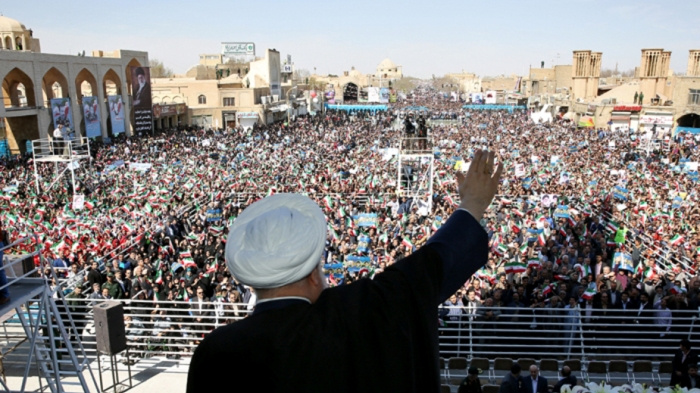Behind Rouhani’s Combative Rhetoric

(Photo: Rouhani on his Monday visit to Yazd in central Iran)
By: Ali Attaran
Since his election to the presidency, Iran’s president Hassan Rouhani has proven to favor a combative style when it comes to standoffs against domestic opponents. He astonished critics of nuclear negotiations in August 2013 when he asked them to “go to hell”. His remarks at his press conference on Sunday, March 6 and Monday, March 7, seemed to have taken his rhetorical battle to a new level.
In his press conference on Sunday afternoon, Rouhani spoke of media who find it hard to approve the positive achievements of the Joint Comprehensive Plan of Action, the JCPOA. “They claimed otherwise for a while, and now found it hard to say the opposite,” he said. “[But] Allah is with those who repent” he scoffed.
Rouhani did not hide his satisfaction during the presser, directly thanking Tehran citizens who sent the entire pro-Rouhani List of Hope into the parliament with their votes. Implicitly referring to the internet blackout of the 2009 elections, he also thanked the Ministry of Communications for standing against pressures and letting the internet and mobile networks run during the election day.
His boldest comment however was in response to a question by the Reformist daily Shargh’s correspondent who asked him about the ban on publishing news and photos of former president Mohammad Khatami, and Rouhani’s decision regarding the ban in his capacity as head of the National Security Council. Rouhani explicitly denied the existence of any directive that prohibits media coverage of Khatami and called it a “joke” (though newspapers, including Shargh continued to take the joke seriously and did not directly mention Khatami’s name in their Monday edition). Moreover, he used the honorific title “hazrat” when speaking of Khatami, a title usually reserved for religious clerics of high status and the Supreme Leader.
Rouhani’s unabashed praise of Khatami spread onto Monday and during his visit to the central city of Yazd Province, birthplace of Khatami. Another Yazd native, top candidate of Tehran elections Mohammad-Reza Aref accompanied Rouhani during the one-day trip. Aref, Khatami’s vice-president during his second term (2001-2005), was a presidential hopeful in the 2013 elections and his withdrawal from the competition then is widely believed to have given Rouhani the momentum needed to win the elections and step into Pasteur presidential office.
In Yazd, where Reformists secured all seats across the province, Rouhani praised his “dear brother Seyyed Mohammad Khatami” amid the crowd’s uproar, stating that “Iran will not forget those who served it and strived for the grandeur of the Revolution”. For the first time since his presidency, Rouhani also thanked Aref for paving the way towards his victory in the “epic” 2013 elections.
Are Rouhani’s remarks a fresh attempt to lift the ban on Khatami, and ideally afterwards leaders of the Green Movement Mir-Hossein Mousavi and Mehdi Karroubi? Despite his promise in 2013 presidential campaign to end their house arrest, Hassan Rouhani has failed to deliver the promise. In this context, his recent comments, coming from a stronger position after a relative victory in the parliamentary elections, may be the start of his renewed attempts to reinforce his support base among the Reformists; and also part of what he has called “the JCPOA 2.0 campaign”, i.e. process of reconciliation between warring factions in Iranian politics. But even if his earnestness is taken as granted, powerful elements of the establishment will hardly budge. Yesterday, Speaker of the Judiciary Mohseni Ejei reiterated the legal status of ban on Mohammad Khatami’s media coverage, quipping that “Mr. Rouhani has probably forgotten about the directive due to his many occupations.”

